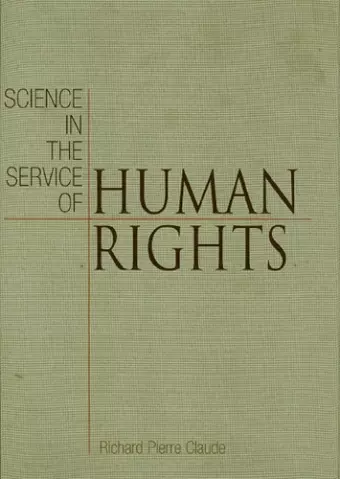Science in the Service of Human Rights
Format:Paperback
Publisher:University of Pennsylvania Press
Published:19th Aug '11
Should be back in stock very soon

Issues that mix science and politics present some of today's most daunting ethical questions. Did China violate the human rights of prisoners in 2001 by harvesting their kidneys and other organs without their formal consent? Do the victims of AIDS in sub-Saharan Africa have the right to effective pharmaceutical treatments that are beyond their financial reach? Have incautious steps toward human cloning trodden dangerously close to the revival of eugenics? Science in the Service of Human Rights presents a new framework for debate on such controversial questions surrounding scientific freedom and responsibility by illuminating the many critical points of intersection between human rights and science.
In the wake of the horrors of the Nazi engineers' grotesque experiments and the devastating advent of the atom bomb, the architects of the United Nations and the Universal Declaration of Human Rights sought to structure new world arrangements where those in power would be bridled by rational principles favoring peace. Though UN-formulated norms have slowly matured to the status of binding international law, the fragmentation of knowledge in modern society is such that few scientists know about the existence and content of the related UN declarations and covenants or their implications.
Richard Pierre Claude's book redresses this lack and satisfies curriculum development aiming to integrate human rights standards into the humanities, law, public health, and the social and physical sciences. It offers a systematic and much-needed clarification of the origins and meanings of everyone's right to enjoy the benefits of the advancements of science.
"An indispensable resource."—Chemical and Engineering News
"Taken together, the clearly articulated imperative outlined in the book for a human rights approach to scientific education, the wealth of case studies provided, and Claude's insightful analysis could lead to the establishment of a new model of people-centered science with the global public as beneficiaries."—Human Rights Quarterly
"This book seeks to empower people at the grass roots level with a full arsenal and awareness of human rights, to connect scientists by a link of responsibility to the public and its right to share in the benefits and applications of their work, and to fortify respect for the human right of those who conduct the work of science."—Future Survey
"Science in the Service of Human Rights is an important contribution. It is a powerful account of efforts by scientists in many fields to document torture, mass murder, ethnic cleansing, and other atrocities, and to strengthen the content of international human rights and humanitarian law. . . . Richard Claude's book will inspire many in medicine to marshal their idealism along these lines."—JAMA
"The author presents a completely thorough description of the historical development, norms, contemporary issues, and relevant factors of the relationship between science and human rights. . . . An exceptional source of information for professors, students, and human rights activists, as well as world scientists."—SUR—International Journal on Human Rights
- Winner of Named Best Book in Human Rights for 2003 by the American Political Science Association 2021
ISBN: 9780812221923
Dimensions: unknown
Weight: unknown
280 pages